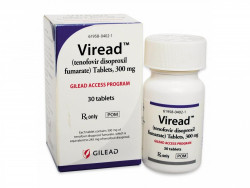Viread (tenofovir disoproxil) Coupons, Discounts & Cost
Viread (tenofovir disoproxil) is a drug that is used as part of antiretroviral therapy. One way to save money on the Viread retail cost regardless of income and insurance status is to use Viread coupons or discount cards from RXCoupons. Use this Tenofovir Disoproxil coupon at this online pharmacy and receive up to 75% off the sale price.
Viread pharmacologic effect
Viread (tenofovir disoproxil) is a drug that is used as part of antiretroviral therapy. Viread is an antiviral drug that is active against HIV.
Main indications: - Treatment of HIV-1 infection in adults (combination therapy with other antiretroviral drugs). - Treatment of HBV infection in adults with compensated liver disease.
Viread contraindications
Do not use Viread in case of hypersensitivity to tenofovir and other components of the drug. The drug is not recommended for children up to 18 years of age. Patients on hemodialysis should not take Viread.
Other contraindications: lactation, lactase deficiency, lactose intolerance, glucose-lactose malabsorption, combination therapy with other drugs containing tenofovir, combination therapy with didanosine, adefovir.
Precautions: renal insufficiency, elderly patients (over 65 years of age).
Guidance for pregnant women
The drug should be used during pregnancy only if the expected benefit for the mother exceeds the potential risk to her child. It is not recommended to breastfeed in order to prevent the risk of postnatal HIV transmission.
Viread dosage
Take 1 tablet during a meal or with a small amount of food.
Treatment of HIV-1 infection: adults - 300 mg (1 tablet) per day.
Treatment of chronic hepatitis B: adults - 300 mg (1 tablet) per day.
Elderly patients should use lower doses (high risk of violations of the liver, kidney or heart).
Patients with mild renal impairment can safely take Viread once a day (there is no need to adjust the dose).
Viread side effects
Blood: neutropenia, anemia.
Metabolism: hyperglycemia, hypokalemia, hyperkalemia.
CNS: very often - dizziness, headache, insomnia, depression.
Respiratory system: very rarely - shortness of breath.
Digestive system: very often - diarrhea, vomiting, nausea; often - flatulence, abdominal pain, bloating; rarely - pancreatitis, dyspepsia.
Liver and bile ducts: rarely - hyperbilirubinemia, hepatitis (both during treatment and after discontinuation).
Musculoskeletal system: rhabdomyolysis, muscle weakness; rarely - osteomalacia, myopathy.
Skin disorders: very often - skin rash, hives; rarely - angioedema, skin discoloration.
Urinary system: rarely - renal dysfunction, renal failure, acute tubular necrosis; very rarely - renal proximal tubulopathy (including Fanconi syndrome), nephritis (including interstitial nephritis), proteinuria, polyuria.
Other: often - asthenia, fatigue.
Viread interaction
Viread should not be used concomitantly with other preparations containing tenofovir.
Didanosine will increase the risk of side effects (such as pancreatitis, lactic acidosis). Combination therapy with didanosine is not recommended.
Tenofovir should not be used concomitantly with adefovir (these drugs have almost identical antiviral effect).
Ritonavir can increase the concentration of tenofovir.
Tenofovir is mainly excreted through the kidneys. Drugs that reduce renal function may lead to an increase in the concentration of tenofovir, as well as increase the concentration of other drugs excreted by the kidneys. It is necessary to avoid using tenofovir simultaneously with nephrotoxic drugs such as aminoglycosides, pentamidine, vancomycin, amphotericin B, foscarnet, tacrolimus, cidofovir.
Ganciclovir, valganciclovir, cidofovir and darunavir may lead to increased concentrations of tenofovir.
Viread cautions
Patients should be informed that Viread therapy does not prevent the risk of HIV transmission to other people.
Tenofovir should not be used concomitantly with drugs that contain tenofovir or adefovir. It is not recommended to take tenofovir and didanosine.
Patients should seek medical advice if symptoms such as joint pain or problems with movement occur. Viread therapy should be stopped in case of nausea, vomiting, abdominal pain, loss of appetite, weight loss, respiratory failure, muscle weakness, signs of lactic acidosis or severe hepatotoxicity.
The risk of hepatotoxic effect is higher in patients infected simultaneously with HIV and hepatitis B or C virus. Therefore, such patients should be monitored carefully.
Hepatotoxic reactions occur in some patients using combined antiretroviral therapy. The risk of hepatotoxicity is higher in patients with liver function impairment. Patients with hepatic diseases who take tenofovir as part of combined antiretroviral therapy should be monitored carefully.

